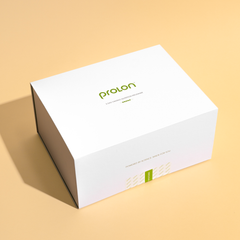
Fasting Over 65: What Are the Considerations?
Living a long and healthy life isn’t just about what we eat, how much we move, or how well we sleep—though all of these certainly play a role. Research also suggests that fasting, especially prolonged fasting like Prolon’s 5-Day Fasting Mimicking Diet (FMD) and intermittent fasting (IF), deliver a host of benefits that can further support healthy aging. While many of us are working to build a longevity lifestyle earlier in life, supporting a longer lifespan through fasting can still be a powerful tool even as we get older. However, for individuals over 65 years of age, it’s important to approach fasting with careful consideration.
The Potential Benefits of Fasting Over The Age of 65
Fasting may offer a range of benefits for adults over 65, supporting everything from healthy aging to improved metabolic function. By facilitating cellular repair and supporting brain and metabolic health, fasting has the potential to improve overall vitality and longevity in older adults.
Healthy Aging Support
Fasting for approximately 72 hours or greater activates the body's natural process of autophagy, which removes damaged cells and promotes regeneration to support longevity. In fact, studies show that three consecutive monthly FMD cycles could have the potential to reduce biological age by as much as 2.5 years.
Metabolic Health Support
As we age, metabolic functions such as insulin sensitivity and blood sugar regulation may decline. Fasting, including both intermittent and prolonged fasting such as the FMD, have been shown to support insulin sensitivity, making it a useful strategy for managing or preventing type 2 diabetes and supporting healthy weight management. Fasting may also help maintain energy balance, improving overall vitality.
Cognitive Function Support
Some research suggests that intermittent fasting can support brain health by encouraging the growth of new neurons. For those over 65, studies suggest that intermittent fasting may reduce the risk of neurodegenerative diseases like Alzheimer's, potentially improving cognitive function and reducing cognitive decline.
Key Considerations Before Starting a Fasting Protocol
While fasting offers a variety of potential health benefits, it’s crucial to approach it with caution and seek guidance from your healthcare provider first. Here are some important considerations before starting a fasting regimen:
Muscle Mass Preservation
Aging is often accompanied by muscle loss (sarcopenia), which can result in weakness and frailty. Most fasting protocols can lead to muscle mass loss if not carefully managed. However, the FMD has been shown to protect against muscle loss while still providing many of the other benefits of fasting. This makes it a promising option for older adults.
Nutrient Needs
Older adults often have increased nutrient needs due to age-related changes in digestion, absorption, and metabolism. Adequate intake of vitamins, minerals, and protein is crucial to prevent deficiencies that could exacerbate existing health conditions. Prolon’s 5-Day FMD Program is designed to provide essential nutrients during fasting periods, which makes it a more suitable option for older adults to maintain their nutrient levels.
Medication Management
Fasting may have an impact on certain health conditions, including blood sugar levels, blood pressure, and heart health. Individuals who take medication for these conditions should consult their healthcare provider before fasting, as adjustments may be necessary. Fasting may affect the effectiveness of medications, especially those related to diabetes or hypertension, so careful monitoring is essential.
Types of Fasting for Adults Over 65
Different fasting protocols may be more suitable depending on an individual’s health status and goals. Two of the most common methods include:
Intermittent Fasting (IF)
Intermittent fasting is a flexible and sustainable approach that can be adapted to individual needs. One common method we recommend is the 12:12 approach, where individuals fast for 12 hours and then eat within a 12 hour window in accordance with their circadian rhythm (from sun up to sun down). These methods are less restrictive and can be more manageable for older adults. Using Prolon’s nutrient-dense Fasting Bars or Fasting Shakes can help provide essential nutrients during the fasting window, ensuring that the body still receives necessary vitamins and minerals.
Fasting Mimicking Diet (FMD)
The FMD is designed to simulate the effects of fasting while still providing the body with a specific set of nutrients. Prolon’s 5-Day Program offers a structured plan that delivers benefits such as support for metabolic health, cellular rejuvenation, and targeted fat loss with protected lean muscle, making it an excellent choice for older adults who want to experience the benefits of fasting without the risks of extreme calorie restriction.
Best Practices for Safe Fasting
To ensure that fasting is done safely and effectively over the age of 65, consider the following:
-
Consult Your Healthcare Practitioner: Before beginning any fasting regimen, it’s essential to consult with your healthcare provider to ensure that it is safe and suitable for your individual health needs.
-
Start Slow: If you’re new to fasting, it’s important to ease into the practice. With IF, gradually increase the duration of your fasting windows while monitoring your energy levels and overall well-being.
-
Stay Hydrated: Water is essential during fasting, as it helps maintain energy levels and supports overall bodily functions. Drink plenty of water throughout the day to stay hydrated, and consider adding electrolytes to your routine if necessary.
-
Prioritize Nutrition: When breaking a fast, prioritize nutrient-dense, protein-rich meals to ensure your body receives the necessary fuel. This is particularly important for older adults, as muscle preservation and nutrient intake are critical during the aging process.
- Listen to Your Body: Fasting should be adapted to individual needs and energy levels. Pay attention to any signs of fatigue, dizziness, or weakness. If fasting feels too challenging or causes adverse effects, consider adjusting the fasting method or frequency.
Fasting can offer significant health benefits for adults over 65, but it requires thoughtful consideration of muscle health, nutrient intake, and medication management. The right fasting approach—whether IF or FMD—can support longevity, metabolic health, and overall well-being when incorporated mindfully.
Sources:
- Nature.com: Fasting-mimicking diet causes hepatic and blood markers changes
- NIH.gov: Effects of Intermittent Fasting on Brain Metabolism
- NIH.gov: Effects of intermittent fasting on cognitive health and Alzheimer's disease
- NIH.gov: Fasting-Mimicking-Diet does not reduce skeletal muscle function
- NIH.gov: Effect of Intermittent Fasting Diet on Glucose and Lipid Metabolism and Insulin Resistance












